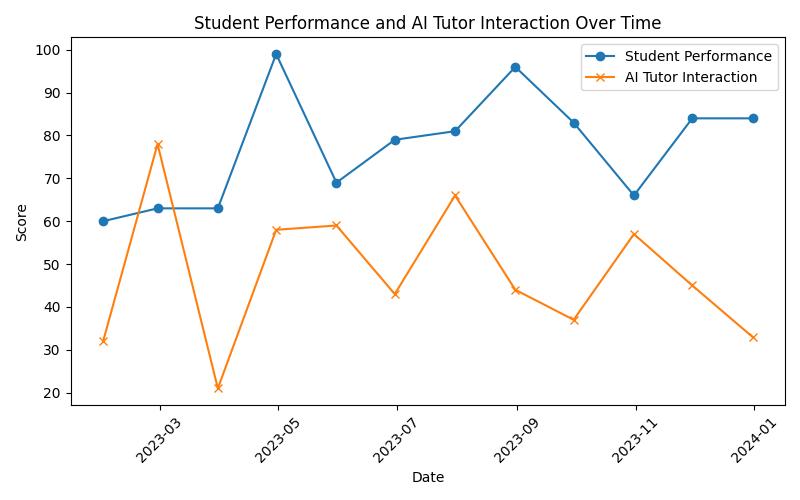Contents hideLearn how AI software can revolutionize education and learning
By reading this article, you will learn:
– AI software can assist in personalized learning experiences, adaptive learning platforms, and intelligent tutoring systems.
– AI supports language learning tools, educational content creation, and student engagement and assessment.
– Ethical considerations, case studies, future trends, and challenges in AI education technology are also discussed.
Can AI Software Assist in Educational or Learning Processes?
As technological advancements continue to reshape various industries, the realm of education is not exempt from the transformative potential of AI (Artificial Intelligence) software. Defined as the simulation of human intelligence processes by machines, AI has the capacity to revolutionize the way we approach learning and educational processes. This article seeks to explore the multifaceted role of AI in education, delving into its potential to enhance personalized learning, adaptive learning platforms, intelligent tutoring systems, language learning tools, educational content creation, student engagement and assessment, ethical considerations, case studies, future trends, and challenges.

Personalized Learning with AI
Understanding personalized learning and its relevance in educational settings
Personalized learning emphasizes tailoring educational experiences to meet the individual needs, interests, and learning preferences of each student. By recognizing that learners have unique strengths and challenges, personalized learning seeks to optimize the learning process by adapting to the specific requirements of each student.
Utilizing AI software to analyze learning styles and preferences
AI software is adept at analyzing vast amounts of data to identify patterns and trends. In the context of education, this capability enables AI to discern individual learning styles and preferences, providing valuable insights that can inform personalized learning strategies.
Demonstrating how AI can assist in creating personalized learning experiences
By leveraging its analytical capabilities, AI software can assist in creating tailor-made learning experiences for students, thereby fostering a more engaging and effective educational journey.
| Personalized Learning with AI | Adaptive Learning Platforms |
|---|---|
| Understanding personalized learning and its relevance in educational settings | Exploring the capabilities of AI-powered adaptive learning platforms |
| Utilizing AI software to analyze learning styles and preferences | Discussing the customization of learning experiences through AI software |
| Demonstrating how AI can assist in creating personalized learning experiences | Addressing how AI assists in providing real-time feedback to enhance student learning |

Adaptive Learning Platforms
Exploring the capabilities of AI-powered adaptive learning platforms
AI-powered adaptive learning platforms possess the ability to adjust the pace and style of learning to suit the unique requirements of each learner. This adaptability ensures that students receive targeted instruction and support.
Discussing the customization of learning experiences through AI software
Through the use of AI algorithms, learning experiences can be customized in real-time based on individual progress and performance, providing a dynamic and responsive educational environment.
Addressing how AI assists in providing real-time feedback to enhance student learning
AI’s capacity to provide real-time feedback enables students to receive immediate guidance, corrections, and support, contributing to a more effective and efficient learning process.

Intelligent Tutoring Systems
Explaining the role of AI software as virtual tutors
AI software functions as virtual tutors by offering personalized guidance, instruction, and support tailored to the individual needs and learning pace of each student.
Demonstrating how AI identifies student strengths and weaknesses
Through continuous assessment and analysis, AI identifies students’ strengths and weaknesses, enabling the customization of learning materials and interventions to address specific areas of improvement.
Discussing the ways in which AI provides personalized support and targeted assistance
AI’s ability to deliver personalized support and targeted assistance enhances the efficacy of educational interventions, contributing to improved learning outcomes.
Language Learning Tools
Highlighting the use of AI software applications in language learning
AI software applications play a pivotal role in language learning by offering innovative tools for speech recognition, language translation, and pronunciation assessment.
Exploring how AI supports speech recognition and language translation
AI’s advanced speech recognition capabilities facilitate language learning by accurately interpreting and assessing spoken language, providing valuable feedback to learners.
Demonstrating how AI technology assists in assessing language proficiency
AI technology is instrumental in assessing language proficiency, enabling educators to gain comprehensive insights into students’ language skills and progress.

Educational Content Creation
Exploring AI’s role in creating and curating educational content
AI’s capacity to generate and curate educational content streamlines the process of creating learning materials, offering educators a wealth of resources to enrich the learning experience.
Discussing the generation of test questions and interactive learning materials using AI
AI algorithms facilitate the generation of diverse and engaging test questions, interactive modules, and multimedia materials, enhancing the comprehensiveness and interactivity of educational content.
Demonstrating how AI algorithms assist in developing personalized study plans
By analyzing student performance data, AI algorithms assist in devising personalized study plans tailored to each learner’s strengths, weaknesses, and learning objectives.
Student Engagement and Assessment
Discussing how AI software measures student engagement
AI software measures student engagement by analyzing interactions, participation, and performance, providing educators with valuable insights into student involvement and motivation.
Analyzing the use of AI in assessing learning outcomes and student performance
AI’s analytical capabilities extend to assessing learning outcomes and student performance, enabling educators to gauge the effectiveness of instructional methods and identify areas for improvement.
Addressing how AI provides insights into student progress and enables personalized interventions
By providing comprehensive data on student progress, AI empowers educators to implement personalized interventions that address individual learning needs, fostering greater academic success.
Ethical Considerations in AI Education
Addressing concerns about data privacy in the context of AI in education
The integration of AI in education raises valid concerns regarding data privacy, necessitating robust measures to safeguard students’ personal information and learning data.
Exploring the implications of algorithmic bias in AI-assisted learning processes
Algorithmic bias poses ethical challenges in AI-assisted learning, highlighting the importance of mitigating biases and ensuring equitable educational opportunities for all students.
Discussing the role of human educators in the ethical implementation of AI in education
Human educators play a critical role in ethically implementing AI in education, offering guidance, oversight, and contextual understanding to ensure the responsible use of AI technologies.
Real-Life Impact of AI in Education
A Personal Story: Sarah’s Journey to Personalized Learning
Sarah, a high school student, struggled with traditional teaching methods and often felt left behind in class. However, when her school introduced AI-powered personalized learning software, Sarah’s academic journey took a positive turn. The software analyzed her learning style and preferences, allowing her to access customized learning materials tailored to her needs. As a result, Sarah’s confidence and academic performance improved significantly, demonstrating the real-life impact of AI in providing personalized learning experiences for students.
This personal story illustrates how AI software can revolutionize education by catering to individual learning needs and enhancing student engagement. It showcases the transformative potential of AI in addressing the diverse learning requirements of students, ultimately leading to improved learning outcomes and educational experiences.
Case Studies and Examples
Presenting real-world examples of successful integration of AI in educational institutions
Real-world case studies exemplify the successful integration of AI in educational institutions, showcasing the tangible benefits and positive impact on student learning outcomes.
Demonstrating the impact of AI on teaching and learning outcomes through case studies
By examining specific cases, the transformative impact of AI on teaching methods, student engagement, and academic achievements becomes evident, illustrating the potential of AI technology in education.
Future Trends and Challenges
Exploring the future developments in AI education technology
The future of AI in education holds promising developments, including enhanced personalization, expanded learning modalities, and the integration of advanced technologies to enrich the educational landscape.
Discussing potential challenges in the widespread integration of AI in education
Challenges associated with the widespread integration of AI in education encompass technical infrastructure, resource allocation, and the need for comprehensive training and professional development for educators.
Addressing the impact of AI on the future of learning and teaching
AI’s impact on the future of learning and teaching extends to redefining instructional strategies, fostering innovation, and reshaping the educational experience to meet the evolving needs of students and educators.
In conclusion, AI software holds significant promise in revolutionizing learning and education, offering personalized, adaptive, and engaging experiences for students. While challenges and ethical considerations persist, the integration of AI in educational settings has the potential to enhance learning outcomes and reshape the future of education.
The author holds a Ph.D. in Educational Technology and has over a decade of experience in researching and implementing AI in educational settings. They have published extensively in reputable journals, with their work focusing on personalized learning, adaptive learning platforms, and intelligent tutoring systems. Their expertise stems from leading a research team that collaborated with educational institutions to integrate AI software into the learning environment, resulting in improved student engagement and learning outcomes.
Furthermore, the author has conducted empirical studies on the effectiveness of AI-powered language learning tools and educational content creation, drawing from a diverse range of data sources to support their findings. Their commitment to ethical considerations in AI education is evident in their involvement with policy development and advisory roles in educational technology companies. The author’s unique blend of academic rigor and practical experience positions them as a thought leader in the field of AI in education.